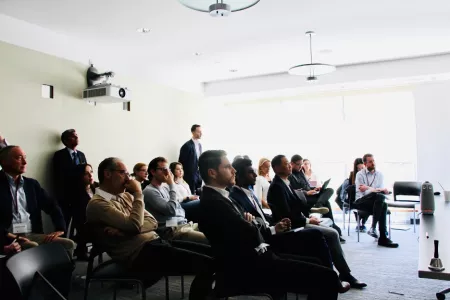
On April 25th, the Technology and Public Purpose (TAPP) Project hosted the “Blockchain for Impact Workshop: Perspectives on International Development, Public Goods, and Regenerative Economy“ at Harvard’s Belfer Center, with coordination help from Polygon Labs and Impact Plus. During the half-day hybrid event, we had engaging discussions with thirty in-person participants, all of whom are experienced professionals and researchers in web3, joined by additional speakers and audience members on Zoom.
Over the last decade, developments in blockchain and various decentralized technologies have spurred the evolution of “web3,” introducing significant disruptions across various industries and sectors. For many innovators, these technologies can significantly improve existing transaction and verification processes, by making them more transparent, efficient, and trustworthy. For others, web3 serves as an ideal platform for developing and scaling innovative economic and governance models towards a more sustainable, collaborative, and democratic future. However, the clear evidence of frauds and scams accompanying these advancements make some critics question the credibility and legitimacy of the field. As such, it is vital to critically examine the field and pinpoint areas and use cases where these technologies can truly bring positive change and impact. The event offered an opportunity for practitioners, academics and researchers to explore the most promising approaches and use case areas for employing web3 technologies and blockchain to promote positive social impact. Through a combination of presentations and interactive sessions, attendees have engaged in rigorous debate and analysis of the opportunities and challenges of blockchain technology, including discussions of the technical, economic, and social implications.
The event was organized into five segments: the first three comprised thematic panels that examined the potential applications of web3 technologies in the realms of international development, public goods, and regenerative economy. Next, we had a virtual talk delivered by Taiwan's Ministry of Digital Affairs (MODA), highlighting web3 as a digital public good in Taiwan. The event culminated with a compelling panel discussion on collaborative futures, focusing on industry-academia collaboration to fully harness the potential of web3.
Here are the key takeaways from the event:
- It is essential for practitioners to prioritize the problems they are trying to solve, rather than primarily focusing on the technology.
- Web3 technologies such as blockchain possess inherent attributes such as transparency, immutability, pseudonymity, security, disintermediation, verifiability, and controllability. These characteristics present the potential for them to influence the domains of international development, public goods, and the regenerative economy.
- Blockchain can address the problem of duplication and efficiency in international development and humanitarian aid in emerging markets, but security vulnerabilities remain a challenge to be solved.
- Innovations in web3 currently revolutionize public goods by fostering community involvement, addressing "free rider" problems, empowering participatory grant distribution, and providing incentives for infrastructure upkeep.
- The web3 technology stack is a complex sociotechnical suite of technologies, meaning that it consists of a technical layer as well as a social layer. Innovation in the latter is required to unlock the potential of the technology.
- Regenerative Finance (ReFi) offers a promising path towards a more sustainable and equitable global economy. By reclaiming externalities and redistributing wealth, we can create an economy that benefits both the environment and its inhabitants.
- Web3 has the potential to build a future towards Plurality, or “collaborative diversity” that is based on principles of interoperability and co-presence.
- Open challenges in the space include scalability, durability, identity verification, access, security, data silos, regulations and complexities of industry-wide cooperation.
- Collaboration among academia, government, and the private sector is crucial for maximizing blockchain's potential while mitigating risks addressing existing challenges, with recent innovations such as Zero Knowledge Proofs (ZKPs) offering potentials to increase privacy and security.
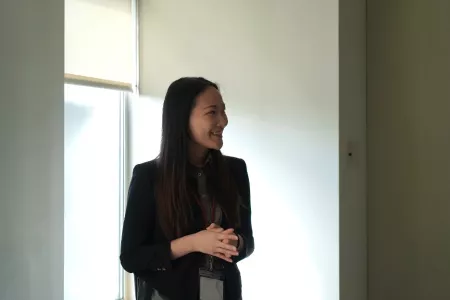
The day commenced with a guest commentary by Rebecca Rettig, the Chief Policy Officer at Polygon Labs. As an industry veteran, Rettig emphasized the paramount importance of strong, global policy for blockchain applications. Her keynote message underscored the need for a delicate balance between fostering innovation and meeting regulatory goals of consumer protection and market integrity, and highlighted the importance of impactful real-world blockchain cases, particularly in the areas of social impact. Rettig noted Polygon Labs' 'Use Case Database' initiative, a project designed to gather, highlight, and make available an open-source database of significant use cases. She further stressed the necessity of collaborative dialogues amongst academia, web3 companies, startups, and government agencies for policy and regulatory development and innovation, advocating for a balanced and non-partisan approach.
Panel I - International Development
The first panel on international development featured five speakers: Ian Vickers, Senior Program Officer at Research for Development; Isha Varshney, Head of DeFi at the Celo Foundation; Karam Alhamad, Ethereum Foundation Fellow; Stan Byers, USAID Cybersecurity Team Lead; and Eduard Peris, Founder and CEO of Impact Plus. The session explored a variety of use cases where web3 innovations hold the most promise for international development and humanitarian assistance, particularly in the context of the Global South and Emerging Markets. In the realm of international development, humanitarian aid is notoriously known for its duplicative nature, and de-duplication is of paramount importance. The humanitarian aid sector ought to seek strategies to enhance efficiency, curtail duplication of assistance, and maximize the impact and reach of assistance more effectively. Several of our panelists embarked on their careers in post-conflict regions such as Afghanistan, Pakistan, various parts of Africa, and other areas around the globe. Their experiences in these regions served as a catalyst for their interest in and subsequent involvement with web3.
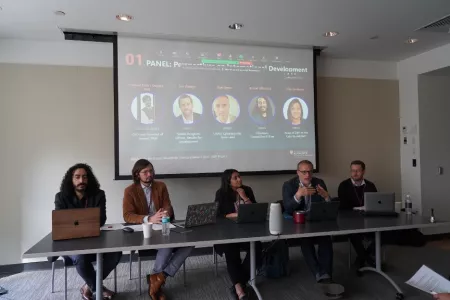
Fostering an Innovation Sandbox for Global Impact
Ian Vickers began the panel by delivering a presentation on the recent work of the Frontier Technologies Hub. Supported by the UK Foreign Commonwealth and Development Office, the program focuses on early-stage innovation start-ups and has funded approximately 50 pilots in 30 countries since 2016. While not a scaling fund, they provide coaching and support to teams exploring high-risk innovations. Their technical interventions include UAVs, AI, smart batteries, IoT, sensors, and blockchain across various sectors. Within the realm of blockchain, the program has supported seven projects with four key use cases. These use cases involve:
- (1) disrupting public works to enhance localization and decentralization;
- (2) improving humanitarian aid distribution efficiency;
- (3) increasing supply chain transparency and efficiency in mining and humanitarian goods; and
- (4) digitizing land record systems and verification of ownership.
Some pilots have shown promising results, with a few exiting early or scaling back blockchain usage, while one pilot in Ukraine is progressing toward a larger proof of concept. Vickers acknowledges the presence of barriers and the need for new thinking to effectively implement blockchain projects. He emphasized the importance of not making assumptions about user behavior and the need to follow rigorous methodologies to design and test services that cater to their audiences. In this sense, Vickers believes that blockchain technology has the potential to revolutionize service delivery by enhancing user retention and allowing for reimagination of the entire service delivery process. He emphasized the value of aligning service delivery with the incentives of all stakeholders involved, thereby creating a more inclusive and efficient system. Vickers is now collaborating with other organizations, such as Impact Plus, exploring the broader background of blockchain for different use cases and identifying effective implementation strategies.
Empowering Emerging Markets
Isha Varshney further underscored the role of blockchain technology in driving social impact in emerging markets. She argued that blockchain's accessibility, scalability, and transparency make it uniquely positioned to cater to the needs of the bottom of the pyramid across emerging markets. At the heart of Celo's mission is the belief that blockchain and cryptocurrency technologies can fundamentally reshape community access to financial products and services, creating avenues for individuals to hold and own digital currencies. The Celo Foundation has undertaken various collaborations with international development agencies, leveraging web3 for sustainable impact. Varshney introduces several Celo’s key initiatives during the panel:
- Humanitarian aid (give): During Covid-19, the Celo Foundation partnered with the Grameen Foundation in the Philippines to provide humanitarian aid, leveraging blockchain and web3 technologies to channel funds to women's communities and micro-entrepreneurs who were challenged by the impact of the pandemic.
- Digital work (earn): Another notable initiative was a digital work pilot with the United Nations World Food Program in Africa, enabling communities under economic strain to generate income through microwork.
- DeFi-enabled lending (lend): Celo's unique selling point is its mobile-first approach, which allows users to utilize its services through smartphones and even basic feature phones. This inclusivity has helped Celo make inroads into emerging markets, notably Latin America and Africa. An example is a white label lending program in Kenya in partnership with Mercy Corps Venture (MCV), where farmers could access loans via feature phones using SMS technology.
- Remittance transfer (send): Another key potential use case of blockchain technology is facilitating remittances across the globe at significantly reduced costs, and enabling . microwork, savings, microloans, and parametric insurance.
- Climate solutions: In addition, Celo Foundation is exploring how to incorporate climate action into their activities, considering options such as carbon markets and Climate Action NFTs.
Varshney concluded by emphasizing Celo's global reach, with operations spanning 60+ countries. The foundation prides itself on its focus on emerging markets and is dedicated to extending its footprint further, offering a truly global ecosystem in the web3 space.
Delivering Aid in Conflict Zones
Ethereum Foundation Fellow and Syrian human rights activist, Karam Alhamad shared his journey from a participant in the Syrian uprising and human rights activist to a refugee in Turkey, working with international development organizations. In 2020, he discovered blockchain technology and saw potential in its application for humanitarian aid and international development, especially in conflict-ridden zones such as Syria. One of his key concerns was the significant loss of funds earmarked for aid due to multiple intermediaries and inefficiencies in the current aid system. Citing one example, he noted that only around 8% to 20% of the funds allocated for Syrian citizens actually reached the frontline Civil Society Organizations (CSOs) or beneficiaries. To address this, he proposed the use of blockchain technology in three main areas:
- (1) Decentralized database: Blockchain can serve as a decentralized database to maintain a transparent and tamper-proof record of transactions.
- (2) Payment system: Blockchain could streamline payments, reducing the number of intermediaries and thereby ensuring more funds reach the intended recipients.
- (3) Coordinating mechanism: Blockchain can facilitate coordination among various stakeholders involved in aid distribution, enhancing the efficiency and effectiveness of aid delivery.
Alhamad is currently working on a project focusing on frontline CSOs, intending to build their capacity and upskill them in blockchain technology. The project involves conducting workshops to educate these organizations about the potential applications of blockchain in their respective sectors, such as health and education. Preliminary findings from this ongoing project suggest that civil society groups prefer certain applications of blockchain, such as remittance, crowdfunding, digital identity, and smart contracts. However, compliance was identified as the main hurdle for adoption, suggesting that policy and regulation need to keep pace with the rapidly evolving blockchain landscape to fully realize its potential in humanitarian aid and international development.
The Question of Security and Vulnerability of Blockchain Systems
Stan Byers highlighted his work at USAID on integrating new technologies into their development paradigms and models. As a major donor, USAID recognized a blind spot in terms of security, particularly regarding the use of emerging technologies. Byers' team was tasked with developing a digital strategy that considers the security implications, including the application of blockchain technology. While blockchain is often perceived as a more secure technology, it is not impervious to vulnerabilities. Byers emphasized the importance of careful application and awareness of vulnerabilities, both technically and socially. Cybercrime has become highly lucrative, with various malicious actors investing in hacking blockchain systems. Direct attacks on blockchains are challenging, given their inherent security features. However, side-channel attacks, including social engineering, can exploit human vulnerabilities to compromise credentials, attack nodes, and compromise bridges between exchanges.
Byers stressed a number of specific concerns, such as attacks on decentralized finance (DeFi) platforms and smart contracts on Ethereum, which saw a significant increase in hacks in recent years. Implementing blockchain technology in different countries and with partner organizations and civil society groups presents capacity challenges. Technical knowledge, containment, training, and literacy are essential, along with addressing governance and regulation gaps. Without proper safeguards, vulnerable communities may suffer losses without recourse. In conclusion, Byers expressed the need to address security challenges in blockchain implementation and emphasized the importance of considering capacity, governance, and recourse mechanisms to protect vulnerable communities.
Key Learnings from Recent Developments
Eduard Peris discussed the objectives of #PolygonImpact, which aims to bridge the gap between international development and the blockchain space. #PolygonImpact has a multi-pronged approach that involves writing thought leadership pieces (or organizing events such as this workshop) and developing blockchain for impact tools, such as Monitoring, Evaluation, Accountability and Learning (MEAL) methodologies. They also focus on supporting the Polygon impact blockchain ecosystem, which is achieved by understanding their needs and proposing solutions that add value. Peris touched on several key findings and challenges from their work:
- One of the interesting trends he noted was the evolution of the blockchain space and its applications in international development. While most of the changes have been incremental, resulting in improvements in areas like remittances, Peris pondered if blockchain might have the potential to cause a paradigm shift in the way international development operates. He considered the possibility of blockchain evolving from a tool that streamlines processes to one that fundamentally transforms existing systems.
- Peris also offered words of caution. He noted that there might be a tendency to over-implement blockchain and emphasized the importance of discerning where and when the technology should be applied. In some cases, it might not add value and could even increase development costs. However, in other situations, it could reduce corruption and increase efficiency.
- Another concern Peris expressed was about the effectiveness of hackathons – an exercise often employed to rapidly develop and test new ideas and technologies – in solving international development problems. While he acknowledged the energy and innovative thinking that hackathons can foster, he questioned if they provide the necessary time and participatory processes to create truly sustainable solutions. International development challenges often require years of effort and a deep understanding of local contexts that may not be achievable in a few days of a hackathon.
Peris concluded by emphasizing the importance of adapting to the needs of the field and to ensure that any blockchain-based solutions are sustainable. By ensuring a measured and nuanced approach towards the implementation of blockchain, and by fostering stronger connections between international development and the technology sector, Peris believes that a meaningful and lasting impact can be achieved.
Panel II - Public Goods
The second panel centered on the topic of “public goods,” featuring four speakers: Renée Barton, Manager of Impact Research at Crypto Council for Innovation (CCI); Scott Moore, Co-Founder and CTO of Gitcoin; Hideki Okada, CMO of Tekkon; and Helena Rong, TAPP Fellow from the Belfer Center. Public goods are non-excludable and non-rivalrous commodities or services that are provided for the benefit of all members of a society. For many, web3 offers a new paradigm for public goods and the commons. Web3's emphasis on community, shared wisdom, and resilience has led to the development of novel community resource distribution mechanisms like quadratic voting, retroactive public goods funding, and impact markets. Innovators within the web3 ecosystem are striving to address the “free rider” problem and “tragedy of the commons” in existing models through novel incentive designs and self-sustaining value-capture methods.

Building Evidence-Based Insights
With increasing scrutiny on crypto regulation, Renée Barton emphasized the importance of framing blockchain's potential for innovation and societal benefits. She drew from her experience with Crypto Research and Design Lab (CRADL), an ethnographic research institute documenting the social impact of crypto, and Crypto Council for Innovation (CCI), an organization informing policy recommendations through evidence-based insights. She highlighted the problematic disconnect between innovation, policy, and research, which she believes contributes to an overall overly critical rather than nuanced conversation about blockchain's potential. By grounding policy in applied research, Barton believes that innovation and access can be expanded, which in turn would foster the growth of the industry.
Through extensive engagement with various stakeholders, CRADL and CCI identified three key areas to grow social impact in the industry: (1) focusing on addressing our greatest societal challenges; (2) attracting more people into the space; and (3) investing in the necessary infrastructure to support builders. On the topic of research, Barton highlights the importance of understanding who the actual users are. She argues that the tech industry often focuses on the total addressable market, while it should really be focusing on the total addressable problem, taking into account whether the people affected by these problems are involved in designing the product and the solution. Barton concluded with a call for submissions and case studies, asserting the importance of centering people in the growth of the crypto and blockchain industry.
Potentials for Participatory Grantmaking Through Quadratic Funding
Scott Moore discussed the potential of web3 technologies in the context of public goods and participatory grantmaking. He emphasizes the democratic potential of web3, explaining how Gitcoin – a blockchain-based platform for projects, independent builders, and funders to connect and work together on open-source software – aims to make online systems more participatory. This involves empowering any group to fund their project by defining their needs and raising funds from the community accordingly, with the hope that broader communities will also recognize these projects as public goods. Moore elaborates on the concept of participatory budgeting or grantmaking, where communities actively decide how donor funding is allocated. This model, based on quadratic funding (QF), helps decide on how matching funds should be distributed by taking into account both the number of donors and the amount donated (i.e., intensity of preference), providing a more democratic and efficient approach to crowdfunding.
Moore cites several successful case studies, including a quadratic voting experiment in Colorado, a participatory grantmaking initiative by the MacArthur Foundation in Chicago, and a recent collaboration between Gitcoin and UNICEF, where they utilized community input to allocate funds to innovation grantees. Moore underscores the need to bring democratic principles online, critiquing the lack of transparency and oversight in current web2 institutions. He proposes that web3 tools can better align local communities with their shared needs, manage globally critical infrastructure, and ensure democratic values in the 21st-century digital sphere. In discussing the merit of collective intelligence, Moore stresses the importance of local communities. Starting at a local level is beneficial when it comes to public goods and infrastructure projects, as it allows people to form a tangible connection to problems and encourages them to help solve them. However, the challenge lies in aggregating these local preferences and groups to address global problems such as climate change or open-source software maintenance. This can be overcome by connecting global issues back to local communities and incorporating them in the decision-making process. As such, education about these issues in relation to local problems becomes key. Moore references Dunbar's number to illustrate the idea that social pressure within smaller groups could lead to more adherence to set rules and norms. Along with the other panelists, Moore emphasized the need to measure the impact of these initiatives and ensure that there are no repeats of past mistakes. This might involve establishing ethical cornerstones and setting measurable goals for community impact from the outset. Moore concludes by encouraging the audience to help build more democratic systems and better relationships with local communities to collectively solve major problems.
Citizen Participation for Infrastructure Maintenance
Hideki Okada shared with us another concrete public goods use case called Tekkon, a location-based social action game that collects infrastructure data from around the world and harnesses the power of citizen participation for infrastructure maintenance. The project leverages a mobile application that incentivizes users with tokens to take and upload photographs of infrastructure in their local areas. These pictures are valuable data for the government and utility companies, who typically have to send out teams to document infrastructure status – a process that is often tedious and costly.
Through a case study in Japan, Okada demonstrated that citizens could document vast areas of infrastructure in a matter of days – a task that could take years for formal government teams. The company pays citizens for these images with tokens, creating an ecosystem that benefits all parties involved. The government and utility companies gain up-to-date infrastructure data at a fraction of the cost, citizens earn tokens for their contributions, and the data can assist the government in making informed decisions about infrastructure maintenance and development. For the citizens, beyond earning tokens, they are able to see tangible improvements in their communities, thus fostering better civic responsibility without any additional tax burden.
At present, the project boasts around 120,000 users across Japan, the Philippines, and Indonesia, and it has accumulated approximately 3.3 million posts. To reward users, the platform converts cash into cryptocurrency, with their tokens already listed on exchanges. Future plans include creating a decentralized database that cities can access by paying with these tokens, thereby nurturing the ecosystem and exemplifying a tangible application of blockchain technology. Okada emphasizes that community participation is integral to the success of blockchain applications and the wider web3 paradigm.
Decentralized Trust-Building Technologies When URL Meets IRL
TAPP fellow Helena Rong shares her recent work at the Belfer Center on “When URL Meets IRL in Web3: Lessons for Decentralized Trust-Building Technologies in Democratic Governance.” Rong argues that web3 technologies such as blockchain is not solely a technological tool, but rather a socio-technical system with both a technical layer and a social layer. While blockchain's technical building blocks, such as cryptocurrencies and smart contracts, help build a reliable source of truth from a technical perspective, the social layer involves interactions with off-chain institutions. Contrary to popular belief that blockchain creates a type of trust that is “trustless” – meaning that the computer code is so robust that we no longer need to trust human intermediaries, Rong argues that the technology does not replace trust, but rather trust is diffused into a greater number of actors, many of whom are invisible. As such, Rong proposes that we understand the web3 technology stack not as decentralized trust-replacing technologies, but as “decentralized trust-building technologies,” which do not seek to replace trust, but instead have the potential to fortify trust through transparent and secure mechanisms only when they are paired with robust institutional designs.
In light of the current decline in trust in democratic institutions worldwide, Rong argues that the question of using Decentralized Trust-Building Technologies as our apparatus to build better democracies amid a trust crisis is less about debating “Should we or should we not use this technology?” Instead, it is a proactive “How might we?” question that boldly seeks to innovate in the social layer, which includes human-centric policy designs, social institutions, and ethical frameworks, to establish a system that is better suited for supporting democratic governance and trust-building.
In examining the social layer, Rong identified eight major application areas for decentralized trust-building technologies: (1) identification systems; (2) voting and governance mechanisms; (3) titling and rights management; (4) collective ownership; (5) financial transactions; (6) public record-keeping; (7) civic participation; and (8) regenerative economies. Over the last year, Rong’s research team at the Belfer Center has surveyed fifteen case studies from around the world, ranging from institutional-led endeavors to grassroots initiatives. She grouped them into three key potential impact areas: (1) enhancing information transparency and security for governance, (2) enabling wider participation and coordination, and (3) delivering local economic benefits for communities. Echoing the other panelists, Rong highlighted the importance of incorporating community involvement from the outset, not merely as an afterthought once the technology is built. She further urged that policymakers must also better understand both the risks and benefits of these technologies to effectively integrate them into existing systems. She concluded that there is no one-size-fits-all solution, emphasizing that technology should be tailored to address specific problems and stakeholder needs.
Unleashing the Power of Web3
From the discussion, several benefits of blockchain and web3 technologies for public goods are worth highlighting:
- Web3 could serve as a conduit for communities to connect with higher authorities, providing evidence of local issues. By ensuring transparency and providing tangible proof of local issues, web3 technologies can empower local communities to voice their concerns effectively.
- Incentivizing civic tasks through gamification, as exemplified by Tekkon, can facilitate grassroots mobilization.
- Blockchain can enable interoperability and allow for seamless communication across different platforms.
- Disintermediation in the web3 space means greater efficiency of monetary transactions and more efficient use of funds and resources compared with traditional systems.
- Web3 technologies could provide more avenues for stakeholder feedback and transparent records, thus improving accountability.
Virtual Talk: Plurality and Web3 as a Digital Public Good in Taiwan
Yen-Lin Huang, also known as mashbean, shared insights on Taiwan's innovative approach to leveraging blockchain for social impact. As a web3 System Architect for the Ministry of Digital Affairs in Taiwan (MODA), Mashbean brings a unique perspective, blending his previous medical background with a passion for “Plurality.” Plurality is the core of the work at MODA. It is a term coined by Taiwan’s inaugural Minister of Digital Affairs Audrey Tang and economist Glen Weyl of the Radical Exchange Foundation. This concept encourages collaboration across diverse groups, viewing technology as a tool to bridge the gap between technology and democracy, deviating from synthetic technocracy and corporate libertarianism. Plurality is embodied in the principle of "Cooperate Across Diversity" (CAD) which aims to foster collaborative diversity, participation, progress, and safety. This philosophy is central to MODA's work and is reflected in their official definition of Plurality as an “Interoperability and Co-presence.” Interoperability refers to creating standards that allow for mutual exchange between systems and tools (i.e., 5G standards), whereas co-presence refers to enabling all voices to come together and discuss issues.
Taiwan's digital transformation, enabled by a robust digital infrastructure, reflects this concept of Plurality. Today, the Taiwanese people readily utilize the internet as a public forum for discourse. Open-source developers, designers, and hacker communities have played a pivotal role in this process, helping to reshape systems such as tax filing and the government's response to emerging challenges, such as Uber's entry into Taiwan and mask distribution during the pandemic through civic tech platforms such as v-Taiwan and pol.is. These successful cases are made possible by the efforts of the g0v (government-zero) community, which plays a key role in Taiwan’s digital transformation.
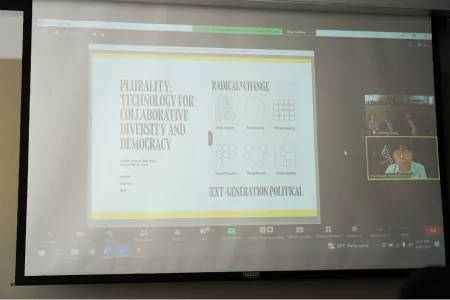
While web3 implementations often prioritize novel technological capabilities, MODA’s experiences from five years of Presidential Hackathons reveal that the crux of success lies in focusing on "people" and leveraging technology to foster seamless communication, consensus building, and problem-solving. MODA has been instrumental in advancing decentralized identity (DID) and Impact Certificate initiatives. Through a partnership with the World Wide Web Consortium, MODA has developed Verifiable Credentials and Decentralized Identifiers to confirm the authenticity of natural persons, legal entities, and novel organizational structures, like DAOs. The ministry is currently working on connecting Taiwan’s Citizen Digital Certificate with the DID standard through a pseudonymous Soul-bound token through natural person identity on the public blockchain. The idea is that Taiwanese citizens can maintain anonymity in their daily lives and reveal their identity as Taiwanese only when needed. This serves as an extension of Taiwan's "Sovereign State", providing a secure, convenient, and privacy-protecting digital identity solution. The ministry is also researching impact certificates in collaboration with Taiwan's web3 open-source community. This initiative aims to use HyperCerts developed by Protocol Lab as the impact certificate for open-source workers. The goal is to create digital public goods through stackable contributions under clear licensing rules.
In closing, Mashbean emphasized Taiwan's commitment to open-source sharing and its willingness to be a partner in the democracy network. He invited all to stand with Taiwan in the pursuit of Plurality, underscoring the importance of collective intelligence, creativity, and resolve in driving genuine and enduring transformation in the digital era. His final message was clear: harness the potential of blockchain technology to create a more democratic, collaborative, and diverse future.
Panel III. Regenerative Economy
The third panel focused on the Regenerative Economy and featured a diverse set of speakers: Ariel Scaliter, Co-Founder of Agrotoken; Wyatt Khosrowshahi, an investor at Shima Capital; Matt Keller, the Director of Impact and Inclusion at the Algorand Foundation; and Naveen Arunachalam, a PhD graduate from MIT and Independent Consultant at NTA Capital. The session was moderated by Elena Jin, MBA Candidate at MIT Sloan and TAPP Research Assistant at the Belfer Center. Our speakers shared views around ReFi (Regenerative Finance) from the lenses of a founder, investor, foundation, and academia.
While the ReFi space has gained momentum in recent years, the concept of "regenerative" is interpretive and can carry different meanings for different people. During the panel, each speaker provided their own interpretation of the term. For example, some defined it as “using capital to incentivize communities to solve systemic problems” such as environmental and climate-related issues, while others emphasized the importance of reclaiming externalities and redistributing wealth to create an economy that benefits both the environment and its inhabitants.
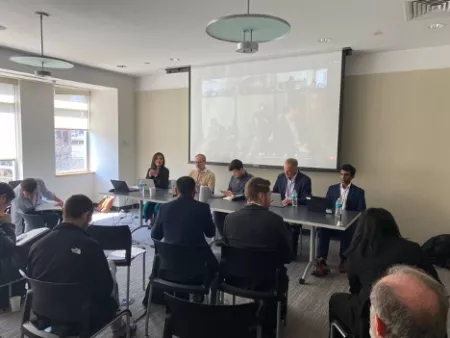
Tokenization of Real-World Natural Assets
Ariel Scaliter shared the mission of Agrotoken and its role in supporting a regenerative economy. Scaliter discusses the complexities of pricing in the food industry and the inherent risks that farmers take on, and the disconnect in the value chain from the farmer to the consumer. By transforming biological assets into financial assets and using blockchain technology to generate proof of origin and redistribute risk, Agrotoken aims to create a global tokenization infrastructure for agro-commodities. With its “green token,” Agrotoken seeks to incentivize farmers to make more sustainable efforts and monetize those efforts immediately, thereby creating a fairer redistribution of wealth within the food supply chain. This approach challenges traditional notions of total consumer utility and aims to encourage sustainability efforts throughout the entire supply chain.
Investing in ReFi
Wyatt Khosrowshahi, an investor at Shima Capital, highlighted the importance of investing in ReFi projects and the three key benefits of blockchain technology for the regenerative economy: (1) transparency; (2) accountability; and (3) collective governance. Blockchain enables more open systems and reduces the likelihood of fraud and malicious behavior with publicly accessible on-chain historical record-keeping, immutable traceability of past behaviors and occurrences, and systems of voting. Collective governance fosters adherence to the collective good, preventing small groups from acting in their own interests. However, there are also challenges to consider, such as scalability, durability, usefulness, and scams. The increasing number of transactions made possible by blockchain technology creates new incentive models that can lead to better systems that reduce negative externalities. Shima Capital's investment in Open Forest Protocol (OFP) showcases the transformative potential of blockchain in promoting transparency and accessibility within the carbon credit creation process. The protocol empowers individuals, communities, NGOs, entrepreneurs, and governments to generate transparent, immutable, and verified proof-of-impact data with the support of an independent network of experts. Through its blockchain-connected products, OFP is revolutionizing the creation, monitoring, and funding of nature-based climate solutions.
Unleashing the Power of ReFi for Inclusive Prosperity
Matt Keller discussed the practical applications of blockchain technology for financial inclusion, social justice, and environmental sustainability based on his work at the Algorand Foundation. He emphasized that efforts to improve the lives of marginalized communities and protect the earth and its environment are not mutually exclusive and can instead be mutually beneficial. The Algorand Foundation has invested in several companies that demonstrate the real-world use cases of blockchain for social good. For instance, HesabPay provides crucial resources to women in Afghanistan through a payment platform, while Flexid builds digital identifications for people in Zimbabwe, enabling them to access financial services beyond their immediate surroundings. TRAM is a distributed carbon marketplace that issues digital tokens for every sustainable trip taken by its users. These examples demonstrate how blockchain technology can be intentionally used to make a positive impact on society and the environment.
Web3’s Role in Real Estate Decarbonization
Naveen Arunachalam presented his key findings from the working paper "The Emperor's New Clothes or the Next Big Thing? Web3 in Real Estate Decarbonization" (available soon here). In this paper, he and his co-authors examined over 300 web3 decarbonization start-ups and evaluated their business models, as well as the technical and regulatory factors that determine their success. They also segmented the market into three categories relevant to real estate decarbonization: data management, tokenization, and marketplace. Data management companies track the effectiveness of environmental interventions such as building upgrades for energy efficiency. Tokenization records the savings made by these retrofits, while marketplaces enable trade of carbon savings on voluntary carbon markets. Three major challenges were identified: (1) immature digital infrastructure with potential gaps in the chain of trust; (2) the energy inefficiency of blockchain operations which could counteract carbon savings; and (3) the existing issues within the carbon market related to price discovery. In addition, the complexities of industry-wide cooperation and the translation of web3 assets and processes into existing certification and legal structures also present challenges. Arunachalam hopes that by sharing his technical and academic insights, he can contribute to discussions on overcoming these challenges and unlocking the potential of ReFi.
In summary, ReFi offers a promising path towards a globally sustainable and equitable economy. By leveraging blockchain technology, we can improve our financial systems and address fundamental challenges in emerging markets, such as identification and access to capital. However, as blockchain is a nascent technology, it also presents challenges that demand concerted efforts to address. The panelists urged that we must work towards improving the infrastructure, education, and collaboration necessary to realize the full potential of blockchain for social good. With the right approach and strategies, ReFi has the potential to help build a better future for all, where economic opportunities are more accessible and inclusive.
Panel IV. Collaborative Futures
The last panel explored the Collaborative Futures and was joined by four great speakers bringing both industry and academia expertise: Cara LaPointe, Co-Director of the Johns Hopkins Institute for Assured Autonomy; Ramesh Raskar, Associate Professor of Media Arts and Sciences at MIT; Jared A. Favole, Senior Director of Policy & Communications at Circle; and Colin Gounden, CEO of VIA. The session emphasized the need for collaboration across stakeholders to fully harness the benefits of blockchain technology whilst establishing proper safeguard measures that prevent malicious attacks or unintended consequences.
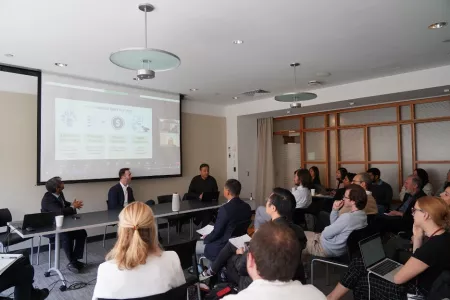
Blockchain Ethical Design Framework
Cara LaPointe began the panel by stressing the importance of ethical design frameworks for blockchain technology, which must be developed with intentionality. LaPointe co-authored the Blockchain Ethical Design Framework at Georgetown University, a tool that enables practitioners to integrate ethical considerations into the design of blockchain technology and ensure that social value is safeguarded. Collaboration among stakeholders is crucial to address ethical considerations, and through these collaborations, LaPointe identified six key concerns and considerations when implementing blockchain: 1) governance structure, 2) identity verification, 3) access, 4) authentication, 5) data ownership, and 6) security. LaPointe also raised questions about the longevity and future security of encrypted data on the blockchain, particularly in the context of developing technologies such as quantum computing. LaPointe concludes by arguing that by focusing on these concerns and working together, we can create a more ethical and responsible approach to blockchain technology and web3 that benefits society as a whole.
Web3 and Decentralized Society (DeSoc)
Ramesh Raskar discussed how decentralization and web3 can address some of the world’s most pressing issues. He cited the healthcare industry as an example of how having “God's Eye View” could enable us to access health data from around the world, train the best AI model, reward contributors, and suggest personalized treatments. However, obstacles such as data silos, regulation, privacy, computational power for handling large volumes of data, fair compensation for data use, and providing an understandable user experience hinder progress. To address these challenges, Raskar launched a new program at the MIT Media Lab called DeSoc@MIT (or Decentralized Society + Web3 at MIT). According to Professor Raskar, the current web3 components include decentralized identity, blockchain, crypto-economic rewards, and decentralized exchanges. These elements could be enhanced with privacy technologies, verifiable decentralization, data marketplaces, and new types of exchanges. The DeSoc program focuses on advancing R&D in digital currencies, decentralized AI, and computational privacy and security, and aims to bring together global leaders to address complex questions surrounding these emerging technologies, with a focus on responsible innovation and shared prosperity.
Collaborating Towards Transparent Humanitarian Aid
Jared A. Favole highlighted Circle's role in leveraging blockchain technology and collaboration for humanitarian aid. Circle, a company that has been in the blockchain space for a decade, has launched USDC, a fiat-collateralized stablecoin. It has settled $10 trillion worth of value on open public blockchains to date and is available through a global network of thousands of digital wallets, exchanges and products and services in over 190 countries. Primarily focusing on payments, Circle positions itself as essential in cases like humanitarian crises. Favole referenced a real-life example from the ongoing conflict between Russia and Ukraine, where the Ukrainian Digital Minister of Transformation launched an Ethereum address to collect donations for protective military equipment. Late last year, Circle partnered with UNHCR, the UN Refugee Agency, for a pilot program to deliver aid to refugees in Ukraine using USDC. The process involves the refugees downloading a wallet, undergoing KYC/AML procedures by UNHCR, receiving USDC, and cashing it out at any MoneyGram location. The program aims to eliminate intermediaries and reduce fees, thereby making the delivery of aid more transparent and more efficient.
This case demonstrated the effectiveness of blockchain technology in facilitating fast, low-barrier, and transparent money transfers, which is often difficult to achieve in the traditional humanitarian aid space. Thus, by using blockchain, fees were reduced significantly, and transactions were completed in minutes rather than days. Meanwhile, Circle is also working on a project called Verite, a decentralized identity protocol that aims to increase compliance and decrease the amount of personal information needed for transactions. In conclusion, Favole suggests that the field ought to embrace collaborative approaches in order to magnify the positive impact of humanitarian efforts, ensuring swift and effective deployment of resources to those in need. This highlights the critical significance of uniting diverse stakeholders with a shared goal of humanitarian aid through collaborative efforts.
Preserving Privacy for Collaborative Impact
Colin Gounden, CEO of VIA, shared VIA’s mission to create cleaner, safer, and more equitable communities through web3 technologies and collaboration with security-conscious organizations, such as the U.S. Department of Defense and the Department of Energy. Colin highlighted the benefits of collective good through collective action and the proactive prevention of malicious attacks or unintended consequences. Verification is a basic requirement for collective action and enables incentives and accountability and links actions to outcomes. However, how can we anonymously know who participated and who didn’t? Protecting identity and activity data is vital, especially for equity-related causes such as reducing child asthma rates in inner cities with high air pollution rates. Thus, Gounden argues that innovations such as Zero Knowledge Proofs (ZKPs) can provide a solution by allowing a party to prove knowledge of information without revealing that information itself. By utilizing ZKPs, VIA strives to address the challenge of preserving the privacy of sensitive data, which often hinders data owners from sharing information freely. The implementation of ZKPs helps facilitate secure and transparent collaboration among stakeholders, furthering the mission of creating positive social and environmental impact. This becomes particularly valuable in scenarios where inter-governmental bodies or nations need to share critical data and information securely and privately. ZKPs offers a robust solution that allows such collaboration while preserving the privacy and security of the shared data, ensuring that sensitive information remains confidential and protected.
In conclusion, future collaboration among academia, government, and the private sector is crucial to fully harnessing the potential of blockchain technology while mitigating its risks. ZKPs serve as a powerful tool to enhance collaboration among multiple stakeholders while preserving privacy and security. Given the rapid pace of technological advancement, it is essential to bring all stakeholders onboard to ensure that intelligent guardrails are established without overregulation. Additionally, academia has a critical role to play in this ecosystem, providing valuable research and education that can help inform government policy and support the growth of the industry. With continued collaboration and knowledge-sharing, we can build a more secure, transparent, and equitable future powered by blockchain technology.
What’s Next?
The conversations and debates have underscored the significant potential and challenges that web3 technology presents, highlighting both its transformative capacities and its attendant vulnerabilities. We were inspired by the discussions and the innovative ideas that emerged from the event. As we forge ahead in the web3 era, we hope to continue these important dialogues, foster stronger collaborations, and further explore ways to use web3 technologies for societal good. The event served as a strong affirmation of the transformative power of web3, but also a reminder of the need for a critical, collaborative, and mindful approach in its development and implementation. We look forward to advancing this conversation in our future endeavors.
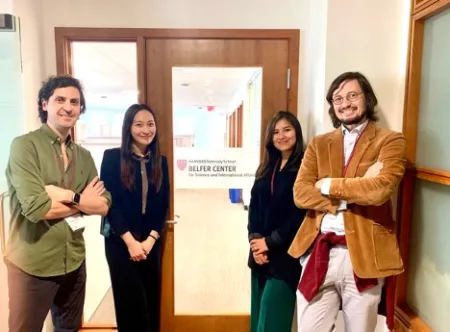
If you are looking to collaborate, please reach out to Helena Rong at hrong@mit.edu and Eduard Peris at eduard.peris@impact-plus.io.
Rong , Helena, Eduard Peris and Elena Jin. “Blockchain for Impact Workshop: Perspectives on International Development, Public Goods, and Regenerative Economy.” May 26, 2023





